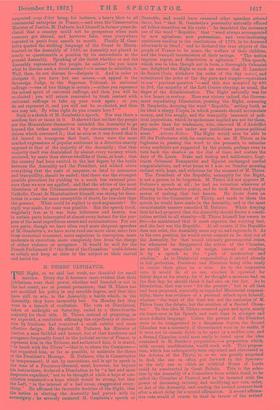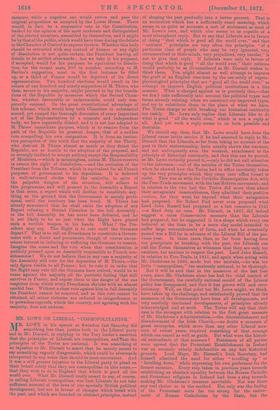M. TRIERS' ULTIMATUM. T HE Right, as we said last week,
are thankful for small mercies. Every day it becomes more evident that their jubilations over their power, whether well founded or not in the last resort, are at present premature; that M. Thiers has not modified his policy in any sensible degree, and that they have still to win, in the Assembly, a battle which, in the Assembly, they have invariably lost. On Monday last they were in a tumult of exultation. The vote on Dissolution, taken at midnight on Saturday, ended in a three-fourths majority for their side. AL Thiers, instead of proposing, as we expected, a resolution affirming the expediency of dissolu- tion by fractions, had conceived a much subtler and more effective design. He deputed M. Dufaure, his Minister of Justice, a man faithful and honest, but of that harshness and arrogance frequently found in the judicial service of France, to represent him in the Tribune, and authorised him, it is stated, "to break with the Ultras"—that is, to abuse the Commune— but requested him, so far as possible, to maintain the thesis of the President's Message. M. Dufaure, who is Conservative by temperament, if not by convictions, and is apt to speak in the tone of a Procureur-General, went, however, far beyond his instructions, declared a Dissolution to be "a last and most desperate expedient," not to be thought of while a hope of con- ciliation remained—a hope which -would be strong, but that the Left, " in the interest of a bad cause, exaggerated every- thing." He affirmed the favourite doctrine of the Right, that the nation in electing the Assembly had parted with its sovereignty ; he severely censured M. Gambetta's speech at Grenoble, and would have censured other speeches uttered there, but " that M. Gambetta's personalty naturally effaced all fellow-travellers on his route ;" he lamented the necessary use of the word " Republic," that " word always accompanied by new agitations, new pretensions, and ever-increasing ambitions tending to the institutions of 1793, to be drowned afterwards in blood ;" and he declared the true objects of the people of France to be peace, the welfare of their children, and the tranquil transmission of their savings. " The nation requires repose, and dissolution is agitation." This speech, which was in idea, though not in form, a thoroughly Orleanist one, delighted the Right to such an extent that M. Lambert de Sainte Croix withdrew his order of the day motive, and substituted the order of the day pure and simple—equivalent to our " previous question "—and this was accepted by 490 to 201, the majority of the Left Centre obeying, as usual, the finger of the Administration. The Right naturally was for a few hours in ecstacy. Here was victory indeed, the Govern- ment repudiating Dissolution, praising the Right, censuring M. Gambetta, decrying the word "Republic," setting forth as its ideal a sleepy Utopia, in which peasants should accumulate money, and live snugly, and die tranquilly, innocent of poli- tical aspirations, which its spokesman implied are not for them, any more than for tradesmen, who, observed M. d'Audriffet Pasquier, "could not under any institutions possess political sense." Astrcea Redux. The Right would soon be able to fill the Prefectures with its creatures, to use M. Thiers as its fugleman in passing the word to the peasants, to ostracise every candidate not supported by the priests, perhaps even to turn back the shadow on the dial of time, and restore the days of St. Louis. Duke and bishop and millionaire, Legi- timist Orleanist Bonapartist and Egotist exchanged cordial congratulations, and went home at 1 a.m. on Sunday morning radiant with hope, and oblivious for the moment of M. Thiers.
The President of the Republic, unhappily for the Right, is not a person to be forgotten. M. Thiers did not approve M. Dufaure's speech at all ; he had no intention whatever of altering his substantive policy, and he took direct and simple means of making that fact known. He drove down on Monday to the Committee of Thirty, and made to them the speech he would have made in the Assembly, and in the most unmistakable manner cancelled M. Dufaure. While denying that he had proposed that the Assembly should decree a consti- tution settled to all eternity—M. Thiers himself has sworn to five—he maintained that it must organise the existing fact, and the fact was the Republic. At all events, if the Republic does not exist, the Assembly must say so, and supersede it. As to his own position, he would never consent to be shut out of the Assembly, for that would intensify governmental crises, for whenever he disapproved the action of the Chamber, he would be compelled to resign, instead of recalling it by a speech to the " path of moderation and wisdom." As to Ministerial responsibility, it existed already in full perfection, President and Ministers being alike ready to vacate their place on a vote. As to the suspensive veto, it would be of no use, whether it operated for thirty days or for ninety, for if he thought a measure bad on the first day, he should think it bad also on the last. As to Dissolution, that was over " for the present ;" but in all that had been proposed, especially as regarded Ministerial responsi- bility, there was evidence of a personal attack upon himself, whereas " the want of the time was not the exclusion of M. Thiers from the debate, but the creation of a Second Cham- ber." To this idea M. Thiers recurred again and again, nearly six times over in his Speech, and each time in stronger and more definite language. Unless the powers of the President were to be exaggerated to a dangerous degree, the Second Chamber was a necessity, if Government were to be stable, if it were not to remain liable to be upset by a sudden vote, and a Second Chamber could most easily be based upon the idea contained in M. Barthe's proposition,—a proposition which, with certain modifications, would work well. This proposi- tion, which has subsequently been explained and elaborated in the debates of the Thirty, is, as we are greatly surprised to find, the one so often put forward in the Spectator as the only one on which an artificial House of Lords could be constructed in Great Britain. This is the selec- tion by the Assembly of a Committee from within itself, to be called the Chamber of Control, and to be invested with the power of discussing, revising, and modifying any vote, order, or Act of the Assembly, and sending the revised measure back after a short delay for a second affirmation. A second affirma- tive vote would of course be final in favour of the revised
measure, while a negative one would revive and pass the original proposition as accepted by the Lower House. There would, in fact, be a suspensive veto in the Constitution, backed by the opinion of the most moderate and distinguished of the elected members, assembled by themselves, and it might be by that of the public, which would have time during the debate in the Chamber of Control to express its view. Whether this body should be entrusted with any control of finance or any right of dissolution is not quite certain, the President leaving all details to be settled afterwards ; but we take it his proposal, if accepted, would for his purposes be equivalent to dissolu- tion, for the vacant seats, 200 in number, according to M. Barthe's suggestion, must in the first instance be filled up, or a third of France would be deprived of its direct representation. Two hundred elections would result in the return of one hundred and ninety supporters of M. Thiers, who then, secure in his majority, might proceed to lay the founda- tions of the Republic by measures which the Second Cham- ber, whether favourable or unfavourable, could only tem- porarily suspend. On the great constitutional advantage of this scheme, which would keep both Chambers in substantial accord, yet compel the thorough discussion of every important act of the Representatives by a separate and independent body, we have repeatedly dilated, and it is not less adapted to M. Thiers' immediate purpose, which is to remove from the path of the Republic its greatest danger, that of a sudden vote compelling his own resignation. It is from an instinc- tive perception of this truth that the majority of the Thirty, who distrust M. Thiers almost as much as they detest the Republic, are so hostile to the adoption of the proposal, and so strongly inclined to accept nothing except the Responsibility of Ministers,—which is meaningless, unless M. Thiers receives in return the right of dissolution,—and the exclusion of the President from the Tribune, which is equivalent for all French purposes of government to his deposition. It is believed in well-informed circles that the majority, in spite of the palpable dangers of the situation, will adhere to this programme, and will present to the Assembly a Report in that sense, a report which will decline to constitute any- thing. on the ground that the Government is merely provi- sional until the territory has been freed. M. Thiers has already announced that he shall resist the adoption of any Report refusing a Second Chamber in the full Assembly ; in the full Assembly he has never been defeated, and he is not likely to be so just when the Right have placed such a terrible weapon in his hands. What !' the Pre- sident may say. The Right is to rule until the Germans depart I' That is to call on Frenchmen to constitute a Govern- ment with a direct and permanent, though of course uncon- scious interest in inducing or suffering the Germans to remain. Imagine the scene and the vote when that consideration is publicly pressed upon an Assembly responsible to French con- stituencies We do not believe that in any case a majority of the Assembly will vote for the deposition of M. Thiers,—the only figure visible to all France ; but to vote it in order that the Right may rule till the Germans have retired, would be to rouse against the majority all the patriotic feeling that still survives in France, and expose them to the danger of the one suspicion from which every Frenchman shrinks with an almost morbid fear. Without a clear vote against him in full Assembly the President cannot be removed, and as this vote cannot be obtained, all minor victories are reduced to insignificance, or to powerless reproofs, which the country, not agreeing with the majority, does not endorse.







































 Previous page
Previous page